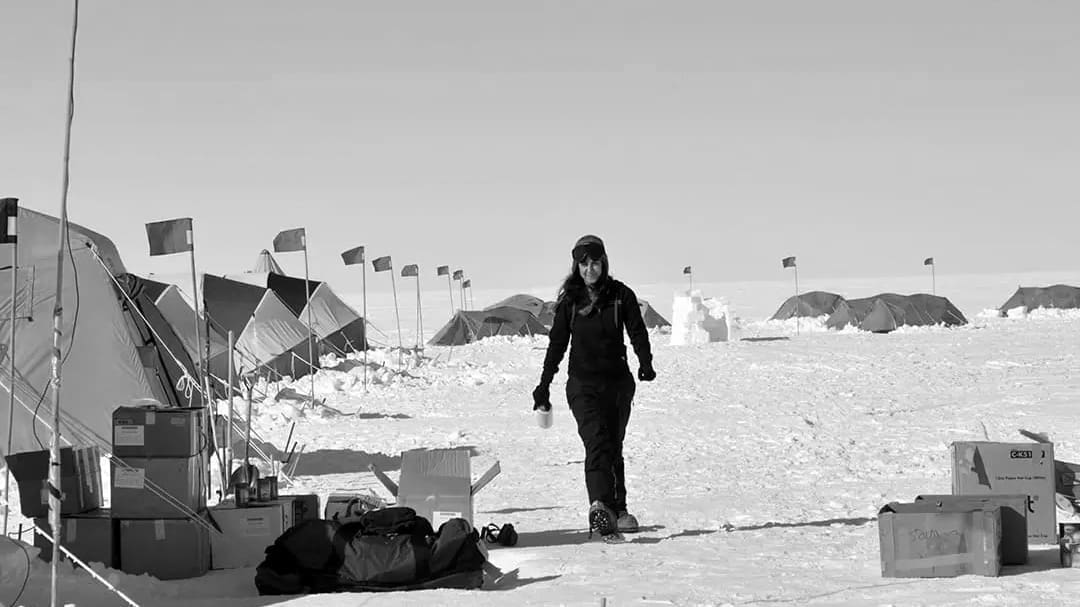Yesterday Camp – Part 1 – “Arrival at Yesterday Camp”
Part 1
Arrival at Yesterday Camp
I flew out this afternoon to Yesterday Camp with Cathy, Laura, and Momme on the second flight aboard a ski plane called a Twin Otter. These planes ferry science teams to and from McMurdo to their deep field camps. They are also embedded with those teams to transport people and equipment around the region as needed. Our mountaineer Peter, mechanic Kyler, and Camp Manager Robin arrived a week earlier to set up the camp. Michael, Alan, Ashleigh, Martin, Melissa, and our project director Patrick, arrived earlier this morning. After flying over what looked like an endless ice sheet, I looked down at the approaching camp. The tents looked like tiny Legos placed in a row in the midst of the vast ice sheet.

Upon arrival, we got to work setting up our individual mountain tents. We had to assemble the tents and dig out the snow anchors that will hold them down during the high winds on the Ross Ice Shelf. This was the first of many tasks that put the trainings of the last couple weeks to the test. It quickly became clear that much of our time, energy and attention would be focused on survival, from layering clothing to drinking lots of water to a myriad of other tasks that needed a higher level of vigilance than I had ever been accustomed to. I am increasingly grateful for the care our instructors brought to our trainings back at McMurdo.
We are outside constantly. We only go inside to eat in the galley tent and to sleep in our individual mountain tents. In both tents, there is very little space. We eat shoulder-to-shoulder, serving each other from pots of great food coming from Robin’s kitchen. Kindness radiates from every act and every sentence. Anything less would make an already uncomfortable place unlivable.
Back in the mountain tent, simple acts require major effort. Every movement is slowed down with the weight and friction of 3-4 layers of insulated clothing. For example, the routine of drying out my feet after a day in our field boots is slow, exhausting work within the confines of the tent. The tight fit of the boots around 2 layers of socks reluctantly gives way after considerable negotiations. The ceiling of the tent makes it impossible to sit fully upright, making the task more difficult. Once the socks are removed, my feet argue with themselves over whether removing the accumulated perspiration or retreating from the cold is more important. I endure the cold as long as possible before wrestling 2 new layers of socks and wiggling into the sleeping bag. This simple task of changing socks requires more time, thought, and perseverance here on the ice shelf. It made me remember those friends back home who, due to sickness or old age, must perform a myriad of repeated health care routines that drain their energy before the day even gets started.
These routines are both individual and communal. Our vigilance includes not only taking care of ourselves but also checking in with each other to make sure no one forgets the important rituals of survival. Pete, our mountaineer, reminds us that we need to regularly ask each other about hydration, body temperature, food, etc. At home, such frequent questions about our well-being would seem overbearing and invasive. Here, they are a welcome reminder of our interdependence in the face of the dangers of the ice.

Don’t get me wrong, there is more to do here than just survival. Robin, our camp manager, is a magician in her little kitchen tent. In addition to calling in regular weather reports and managing communications with McMurdo, she cooks amazing dinners for us. Her care in the preparation of great food under unimaginable conditions demonstrates to all of us that hospitality knows no frontiers. It also demonstrates that no matter where you are good food matters.

